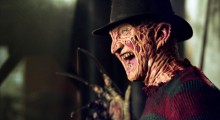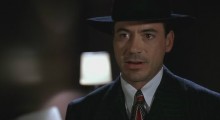Directors
Interviews - Directors
-
“The Mid-Size Studio Feature is Gone”: Ken Kwapis on A Walk in the Woods

When Ken Kwapis was a cinema student at USC, he ran the school’s film society and programmed retrospectives that enabled him to not only study the classics but also to meet several of the directors who made them – among his guests were Orson Welles, John Cassavetes, and Don Siegel. The experience clearly influenced Kwapis when he became a director himself, as he forged a career similar to that of many of the filmmakers of the classical studio era, albeit without the same corporate support system. Like a Michael Curtiz or Victor Fleming, Kwapis employs a self-effacing style and often […]
-
Women Directors in Locarno: Anne Émond, Athena Rachel Tsangari, Petra Costa and Lea Glob

Chevalier is a film about six men vacationing on a yacht in the middle of the Aegean Sea. After the world premiere in the main international competition at the Locarno International Film Festival, I climbed an arduous, though relatively small Swiss mountain to sit down with director Athina Rachel Tsangari during her final hours in Locarno. My own last hours in Switzerland were spent with Anne Émond, whose film Our Loved Ones also celebrated its world premiere in Locarno. Our Loved Ones is about how a suicide affects a family living in a small town outside Quebec. Both Our Loved […]
-
“I Don’t Feel Like I Gave Birth to Jesus”: Wes Craven on A Nightmare on Elm Street

Wes Craven, one of the greatest horror directors of all time, a man who directed classics in almost every decade of his professional life,passed away yesterday, August 30, of brain cancer in Los Angeles. Last October, Craven spoke to Filmmaker‘s Jim Hemphill about perhaps his most celebrated creation, A Nightmare on Elm Street. As a way of remembering Craven, we are reposting it today. On November 9, 1984, Wes Craven’s A Nightmare on Elm Street opened in American theaters and changed the movie industry forever. Serving as a bridge between the primal ferocity of Craven’s earlier work (Last House on […]
-
Discovering the Spiritus Loci: Simone Rapisarda Casanova on The Creation of Meaning

The primary subject of The Creation of Meaning — the second feature by the delightfully named Simone Rapisarda Casanova — is the equally delightfully named Pacifico Pieruccioni, who lives in a village at the very top of the Tuscan Alps. He makes a living by selling his goats’ milk, walking briskly from his home down to a tiny locker built into the woods so customers don’t have to walk all the way up the mountain to him. In the dark forest, it seems as if the liquid is glowing, as if the light bulb Hitchcock put in a glass of milk in Suspicion had been employed here. […]
-
Building Trust with the Gringo Mariachi: Aaron I. Naar on Mateo

The story of Matthew Stoneman, “America’s first gringo mariachi singer,” at first sounds more like fodder for the next Will Ferrell vehicle. But in the hands of IFP Doc Lab alum Aaron I. Naar this weirder-than-fiction tale transforms into something far deeper. After a prison stint led to the New Hampshire native’s education in both the Spanish language and Cuban music, the unassuming Stoneman turned his life not just around, but upside-down. With both patience and compassion Naar follows this truly remarkable artist with the voice of an angel as he battles his demons, and ultimately sacrifices everything to realize […]
-
Place of Passage: J.P. Sniadecki on The Iron Ministry

The Iron Ministry takes place on a moving train, whose compartments expand over the course of the film to reveal a host of rocking sights: hanging raw meat, cigarettes floating in water, boxed goods in transit, and myriad people engaged in conversations about politics and its impact on their daily lives. The people and their destinations are often both left unnamed, with a ceaseless sense of forward motion remaining as the greatest takeaway. “This is a civilized train, so please feel free to piss, shit, and throw trash all over the aisle,” says a young boy early on in parody of […]
-
Steering Away From “Ooga-Booga” Horror Movies: John McNaughton on The Harvest

In 1985, a pair of brothers who owned a video equipment rental business in Chicago offered local filmmaker John McNaughton $100,000 in financing if he could come up with a low-budget horror movie. They probably got a little more than they bargained for when McNaughton delivered Henry: Portrait of a Serial Killer, a chilling (though also blackly comic) character study loosely based on the experiences of real life sociopath Henry Lee Lucas. McNaughton eschewed slasher movie conventions in favor of an ultra-realistic, serious-minded film with no escape hatch for the audience; one of the greatest cinematic representations of the banality […]
-
“When You Have a Message or Issue-Driven Film, It’s Already an Act of Patriarchy”: Hubert Sauper on We Come as Friends

Hubert Sauper’s new film We Come As Friends is more non-fiction poetry than traditional documentary. Following his Oscar-nominated Darwin’s Nightmare, We Come As Friends is set in South Sudan as it becomes its own country. A new (or, rather, the same old) colonialism is represented by rapacious outside interests pressing in on Sudan from all sides, desiring the country’s oil and natural resources. Amidst it all, Sauper and his collaborators build their own tiny aircraft, complete with a wind-up music box on the dashboard, and fly it into a nexus of cultural communication gaps, deception, corruption, violence and a rhapsodic […]
-
“I Was Getting Hate Mail Before I Even Started Shooting”: Keith Gordon on The Singing Detective

Writer-director Keith Gordon had one of the best film schools imaginable in the late ’70s and early ’80s, when he broke into the business as an actor and appeared in several now classic movies including All That Jazz, Dressed to Kill, and Christine. He must have learned quite a bit watching the likes of Fosse, De Palma, and Carpenter direct, because his own filmography is one of the most consistent in all of contemporary American cinema. Gordon has directed five features to date, every single one of which is an uncompromised treasure – and each one is different from the […]
-
Five Women Directors Discuss their Art and Craft at the New Horizons Film Festival

On the fourth anniversary of Amy Winehouse’s death, I was watching the opening night screening of Amy at the New Horizons Film Festival in Wroclaw, Poland. Kurt Cobain: Montage of Heck, another documentary about a legendary musician who died at the age of twenty-seven, was also slated in the New Horizons program. Rainer Werner Fassbinder, the controversial German filmmaker who made over 40 films before his death at thirty-seven years old, was the subject of Fassbinder, a documentary also screening in Wroclaw. The Actress, a documentary about the Polish movie star Elżbieta Czyżewska, who fled from communist Warsaw to New […]










